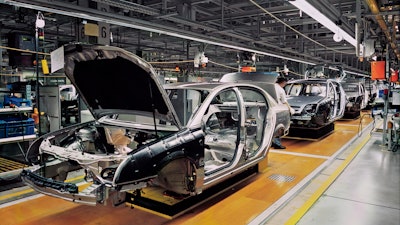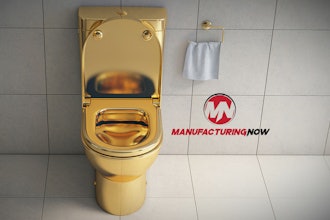
Auto suppliers are facing multiple operational challenges these days, and one of them is advancing their journey towards operational excellence.
One critical step to help with this journey is data estates, the infrastructure that enables suppliers to manage all of their data in one place and make better, more informed decisions.
Here are four ways that data estates enable operational excellence for auto suppliers.
1. Increase Worker Productivity
Automotive suppliers have spent the past few decades prioritizing cost reductions and driving efficiencies; squeezing their production to get every last penny out of it.
But as we all know, you can’t cost-cut your way to success. This intense focus on cost-cutting has resulted in significant under-staffing and a heightened propensity for companies to address pain points at the absolute last moment. It has also created a knee-jerk approach to relying on technology to solve business challenges. Today, it is common to find automotive suppliers that have at least 15-point solutions operating the manufacturing processes, none of which meaningfully talk to each other.
This means one process engineer is now looking at 15 disparate technologies and bouncing around from one to the other, putting data in, getting data out, and working with spreadsheets to try to make sense of the data.
Today, there are no more areas to cut. The only way to increase worker productivity is for auto suppliers to address these disparate solutions. They must wisely start looking at investments in technology, including data estates. This is the only way they're going to get out of this cost-cutting race to the bottom.
A data estate provides auto suppliers a single platform, one that includes their database and consolidates all information from all sources. It includes all reporting and analytic functions, and workflow automation processes. A data estate helps an auto supplier effectively absorb, process, share, and act upon their data.
Real-world example. A global auto supplier faced the problem we just described. Their global forecasting solution was running on Progress database. Their RFP management solution was hosted in a 20-year-old PLM system and involved significant manual work with Excel spreadsheets. The supplier-managed programs, the process that took place after the supplier won a bid, and the APQP process entirely in a SharePoint database stitched together with Excel. All these systems were disconnected.
Today, this auto supplier has consolidated all of these functions with a data estate that allows them to do combined reporting and has enhanced capabilities for forecasting. Now the supplier has all of its forecast data, its bids, and all ongoing programs updating in the system according to the OEM's projections. This 365-degree, real-time view of the supplier’s data is available at the touch of their fingers so that they can see globally what their cash flow is going to look like in a year.
2. Optimize Supply Chain
When it comes to managing inventory, many auto suppliers don’t have a problem managing what’s within their four walls. It’s what’s outside their facility that causes the headaches. They lack visibility into their entire supply chain. What is in transit, for example? Where is it in transit? What are the average times? What are the current and average expected delivery times? These are the kinds of questions that keep auto suppliers up at night.
To answer these questions and more, many auto suppliers give a worker the job of monitoring the supply chain, using Excel and a few hours a week to create a snapshot of the supply chain status. The problem with this approach, of course, is that it is only accurate at the time of creation. That accuracy soon changes. And, the process is manual, cumbersome, and time-consuming.
A data estate puts all of this data in the cloud. It allows access and inputs and information sharing between auto suppliers and their vendors and suppliers. Their data becomes their suppliers’ data, and vice versa. Suppliers own, manage, and update their information, and the auto suppliers leverage that data.
In many instances today, this data sharing is happening with Microsoft Azure services. Azure gathers information from the web and from auto supplier partners and updates the auto supplier’s systems automatically and in real-time.Real-world example. One auto supplier with a supply chain visibility problem was spending 40 to 60 hours a month maintaining Excel spreadsheets to keep track of incoming containers. They implemented a data estate that uses robotic process automation to retrieve that information from the freight forwarders and automatically update it twice a day.
The data estate then surfaces vital metrics on how each freight forwarder is performing, such as average days on the water and average days on the train. The data estate has taken a process that took up to 60 hours of manual effort and reduced it to an automated task that requires not a minute of human effort.
As a bonus, after implementing their data estate, this auto supplier discovered that the reconciliation of their freight was inaccurate. They corrected the problem and ended up saving over $400,000 a year.
3. Maximize Overall Equipment Effectiveness (OEE)
Another challenge facing auto suppliers is optimizing machine utilization. They want to ensure that their production line is running efficiently and that they are minimizing lost time. They want their scrap percentage to be low and their first pass quality score to be high.
But maximizing OEE is difficult when auto suppliers use more than a dozen disparate systems to manage manufacturing operations. They lack the ability to connect the dots between the disparate processes and to understand the consequences of making any changes, such as putting four workers on the line instead of six.
Many auto suppliers lack the manpower to constantly access numerous systems and databases and pull data together to make decisions. They want to improve their OEE but lack the integrated, real-time view of their data to make that possible.
A data estate helps auto suppliers by not only housing their disparate data in one place. It layers on top of that data, artificial intelligence and machine learning, graphical representations, historical trend information, and more. This enables auto suppliers to see how a change made in one place impacts other areas of the manufacturing process, and thus achieve their goal of higher overall equipment effectiveness.
Real-world example. One auto supplier did just that. They were losing time because of their inability to learn from their equipment on the shop floor. The result was that the company had to add a Saturday shift and sometimes a Sunday shift as well each week. With hundreds of workers being paid time-and-a-half overtime, this problem was costing the auto supplier plenty.
So, the auto supplier deployed a data estate. After conducting a value stream mapping exercise and other analyses, they cut their overtime shifts from up to two a week to just one shift every three weeks. The data estate helped them see what was driving their unnecessary—and costly—overtime.
4. Realize Significant Cost Savings
Because of the race to the bottom in cost-cutting, technology is one of the only ways left to save money. The advantage of data estates is that auto suppliers can deploy them incrementally, based upon priorities, thus getting faster, targeted results with smaller investments over time.
And because the data estate is more than just a place to house data, it gives executives and management all the tools they need to make data work for them. Instead of individuals having to go and retrieve information from multiple systems, the data estate surfaces that data automatically.
Data estates lower costs in other ways. Auto suppliers can stand up a digital twin of their production line in the facility before they’ve even created the production line or invested a single dollar of capital. They can also test a new design for a component or an EV and collaborate on it globally, without having to prototype it with a physical product.
Real-world example. A global manufacturer of high-end transmissions for luxury and industrial vehicles. They were having a challenge placing new equipment in plant drawings based solely on equipment layouts and photographs. They received layouts for new equipment to come into the plant and had to adjust and then place those pieces of equipment in the plant drawing. They then had to take screenshots at specific angles, so they got exactly what they wanted to see, and then had to adjust and fill in the blanks with an explanation.
The company typically had to fly in an engineer from the overseas manufacturer for up to five days of consultations. This caused delays. And they knew that the company that moves the fastest with the most innovative technology is the one who's going to come out on top.
This auto supplier now uses Microsoft mixed-reality tools to increase efficiencies on the shop floor. Using HoloLens and Microsoft Layout, their planning engineers view spatial planning designs in the real-world shop floor environment, saving hours of work.
Conclusion
If you are an auto supplier looking to increase worker productivity, optimize your supply chain, maximize overall equipment effectiveness, or realize significant cost savings, consider deploying a data estate, particularly a Data Estate for Automotive Suppliers.























